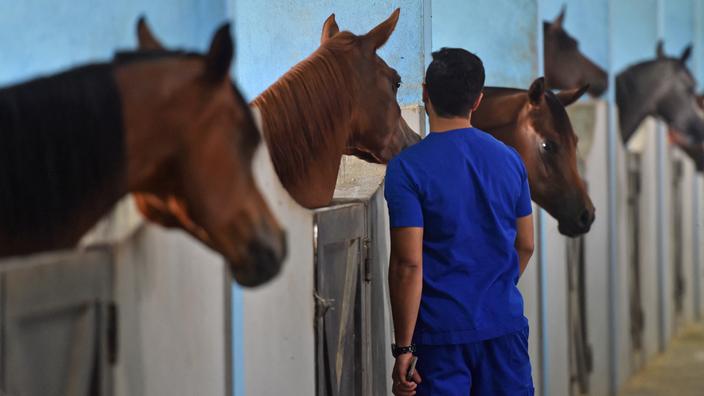Speaking of epidemic.
This time, it is the equine world which is affected, and with full force.
Rhinopneumonia, a disease already well known to equine veterinarians, has resurfaced in recent weeks and has reported ten deaths in Spain and several hundred cases in Europe.
In France, ten outbreaks have already been counted in Calvados, Haute-Savoie, Hérault, Seine-et-Marne and New Aquitaine.
Other clusters were also detected in Belgium, Germany and Switzerland.
Read also: Stretching horses, the puzzle of equestrian centers during a period of confinement
It all started with an international competition at the end of January in Valencia, Spain, where nearly 850 competition horses were gathered.
On February 14, a French rider won the grand prize of his competition, but he felt his horse was less in shape than usual.
He takes his temperature in the evening, notices a slight fever.
Two days later, while the fever continued, another mare showed symptoms.
A rider, already returned to France, tells her that her own horse has tested positive for rhinopneumonia
.
“
From there, everything went very quickly,
” says Anne Couroucé-Malblanc, equestrian veterinarian appointed in Valence by the French Equestrian Federation (FFE).
A vast test campaign has been launched on symptomatic horses, but it is too late.
Within 48 hours, 52 horses tested positive.
"
Hundreds of horses in the same poorly ventilated tent, in boxes stuck to each other, and which then return to their countries, it did not take more to form a cluster
".
Neurological symptoms that worry
"
This disease is nothing new, but on this scale, it is completely new
", warns Anne Couroucé-Malblanc in
Figaro
.
Herpesviruses types 1 and 4, better known as rhinopneumonia, are the equine version of the human flu.
Until now, they have manifested themselves by breathing difficulties or an abortive effect in mares.
But this time, it is the nervous system that the virus attacks.
“
After a few days, it reaches the spinal cord and reaches the nervous system,
” explains the veterinarian.
“
The tail becomes flabby, then the ataxia spreads over the whole body
”.
The horse, which can no longer stand on its legs, must then be hospitalized and maintained by a strap system to prevent it from lying down, which is dangerous for equines.
"
Almost 20% of the horses returned from the Valencia Spring Jumping Tour show these neurological symptoms
", indicates Christel Marcillaud-Pitel, director of the Equine Pathology Epidemio-Surveillance Network (RESPE).
“
It's a small part, but enough to worry.
"
To read also: Mutilated horses: 500 facts identified, of which only 16% of human origin
Faced with this new "
variant
" of the virus, which is more contagious and more dangerous, the vaccine against rhinopneumonia shows limited effectiveness.
In a press release published on March 3, RESPE acknowledged that a first vaccination "
will have little effect in the midst of an epizootic
" since it does not guarantee immunity.
But it remains an "
effective measure
" by limiting its distribution, however specifies the organization, which encourages equestrian officials to carry out the necessary reminders.
The horse world at a standstill
Faced with this lightning spread, the French Equestrian Federation (FFE) and the French Equestrian Society (SHF) immediately reacted, announcing the suspension of all national and international equestrian competitions from March 1, and until the end of the month.
The International Equestrian Federation (FEI) has also ordered the suspension of all competitions in 10 European countries including Italy, Portugal, Belgium, Germany and the Netherlands.
In Valence, the FFE sent veterinarians to organize the repatriation of 180 horses still remain blocked.
"
We asked the Minister of Agriculture to intervene immediately with his counterpart to authorize urgently the medical repatriation of our horses, according to a strict health protocol
," said the General Delegate of the federation on the site.
"
As soon as they arrive in France, they will be isolated in the best conditions to receive adequate treatment
", he certified.
Read also: At Le Mans, collecting waste on horseback revives the anti-species debate
"
The reaction of the FFE has been beneficial,
" says one at the Pôle international du cheval Longines-Deauville, in Calvados, where no case has yet been detected.
At the equestrian center, horses returned from competition were placed in isolation and await the second nasal swab, for a complete test.
"
We respect all barrier gestures: hand washing, equipment disinfection, equipment specific to each horse,
" said the center to
Le Figaro.
At present, no deaths from the epidemic have been reported on French soil.

